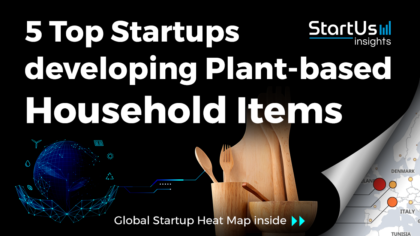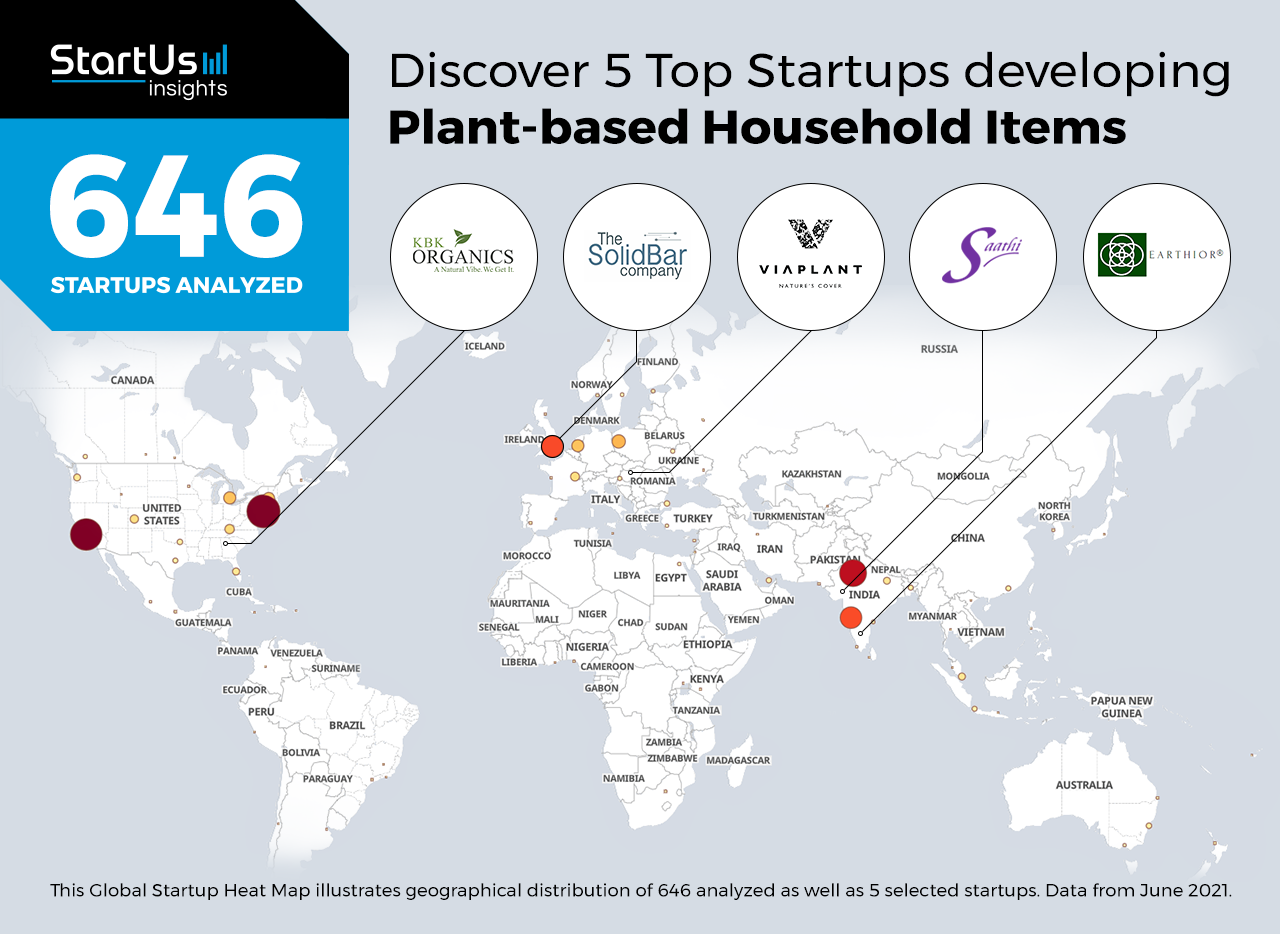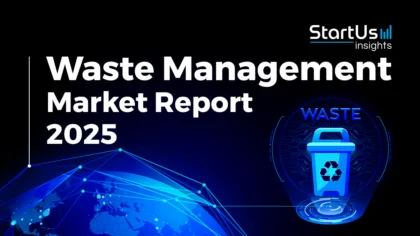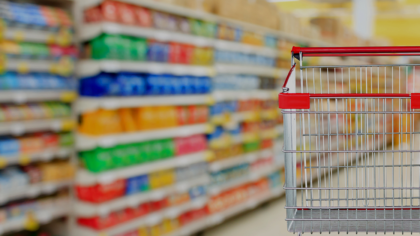Accelerate Productivity in 2025
Reignite Growth Despite the Global Slowdown
Staying ahead of the technology curve means strengthening your competitive advantage. That is why we give you data-driven innovation insights into sustainability & the Circular Economy. This time, you get to discover 5 hand-picked startups develöoing plant-based household items.
Global Startup Heat Map highlights 5 Top Plant-based Household Items out of 646
The insights of this data-driven analysis are derived from the Big Data & Artificial Intelligence-powered StartUs Insights Discovery Platform, covering 2.093.000+ startups & scaleups globally. The platform gives you an exhaustive overview of emerging technologies & relevant startups within a specific field in just a few clicks.
The Global Startup Heat Map below reveals the distribution of the 646 exemplary startups & scaleups we analyzed for this research. Further, it highlights 5 startups that we hand-picked based on criteria such as founding year, location, funding raised, and more. You get to explore the solutions of these 5 startups & scaleups in this report. For insights on the other 641 plant-based household items, get in touch.
Earthior makes Tableware from Areca Palm Trees
While eating from plastic dishes, toxic chemicals leach into food. Biodegradable, plant-based alternatives not only reduce plastic waste but are also easily compostable. But paper plates are not that durable as they often collapse or become soggy when exposed to weight or liquid. As a result, startups are turning to plants for making dinnerware. These are much more durable and offer a better look too. What is more, some of them can be reused and are microwave safe.
Indian startup Earthior makes eco-friendly tableware from naturally dried areca leaf sheaths. The plant-based dinnerware is timber-free and an alternative to plastic disposables. They can be used multiple times with dry and non-greasy food. The startup handpicks naturally dried and fallen areca sheaths, and washes and dries them for processing. They are then machine cut, heat pressed, trimmed, polished, and de-moisturized to produce tableware.
Saathi produces Banana Fiber-based Sanitary Napkins
Most of the sanitary pads worldwide are made from plastic, which is harmful to the environment as they take very long to decompose. Eco-friendly pads often use cotton instead, but growing cotton also has a massive carbon footprint. This is why startups are working towards more sustainable alternatives. For example, banana fiber offers an alternative as growing bananas uses much less water and fertilizers per ton produced than cotton.
Saathi is an Indonesian startup that produces compostable sanitary napkins using banana fiber. This fiber comes from the stems of banana trees, which are usually discarded after harvesting. Saathi buys banana stems from local farmers and extracts the fiber. The farmers ferment the residue to use it as an organic fertilizer. Moreover, it does not require extra land for the production of this fiber, further enabling sustainability.
The Solid Bar Company offers Plant-Based Personal Care Items
Most toiletries and cosmetics contain chemicals like butylated hydroxyanisole (BHA) and butylated hydroxytoluene (BHT), coal tar dyes, aluminum, and dibutyl phthalate. All of these are harmful to consumer health as well as the environment. This is why consumers are turning to alternatives that do not contain toxic chemicals. Personal care and cosmetic startups are switching to natural raw materials such as plant-based ingredients. This reduces their carbon footprint and creates a better reputation for sustainability.
British startup The Solid Bar Company offers organic and vegan personal care items like haircare, skincare, children’s care, and pet care products. It uses ethically sourced, naturally derived, and sustainable ingredients. It sources over 80 plant-based ingredients for its products, including cocoa butter, neem oil, rice bran wax, apricot kernel oil, arnica, etc. Besides being safe for the skin, ingredients like neem and apricot kernel oil have anti-inflammatory properties that relieve swelling.
Viaplant provides Plant-Based Furniture & Interior Decorations
Materials like plastic and synthetic leather which are used in traditional furniture are not biodegradable. Moreover, most of the discarded furniture ends up in landfills and contributes to solid waste. Very few furniture companies recycle them to make new furniture. As a result, consumers are increasingly switching to sustainable furniture. Based on the concept of closed-loop, sustainable furniture startups design furniture that is reused, disassembled and then reused again. Moreover, the use of plant-based materials or non-toxic furniture stains further reduces the environmental impact of furniture items.
Viaplant is a Hungarian startup that provides plant-based material for interior design and a wide range of furniture, such as lamps, nightstands, coffee tables, wallpapers, etc. The startup uses only the renewable plant parts, i.e., leaves and flowers with a regeneration cycle of one year or less, but offers a wide range of textures and colors. Some of them are obtained from roses, flowers of small weed, bush grass, reed, goldenrods, oleaster, and other yellow, red, and brightly colored leaves.
KBK Organics produces Plant-Based Laundry Detergent
Most laundry detergents contain chemicals like parabens, phosphates, chlorine, and artificial colorants. These are harmful to the environment as phosphates in detergents are responsible for freshwater algal blooms that release toxins and deplete oxygen in water bodies. As a result, many startups are turning to natural ingredients to produce detergent and other fabric care products.
US-based startup KBK Organics produces chemical-free plant-based laundry detergent. It offers both scented and unscented variants. The scented ones are honeysuckle, lemon, and lavender. The ingredients include baking soda, sea salt, essential oils, and starch, among others. Besides being eco-friendly, the detergent is also safe for pets.
Discover more Sustainable Startups
Startups such as the examples highlighted in this report focus on emissions reduction, recycling, new biodegradable materials as well as fighting pollution. While all of these technologies play a major role in advancing sustainability, they only represent the tip of the iceberg. To explore more technologies, simply get in touch to let us look into your areas of interest. For a more general overview, you can download one of our free Industry Innovation Reports to save your time and improve strategic decision-making.




![Explore the Top 10 Waste Management Industry Trends & Innovations [2025]](https://www.startus-insights.com/wp-content/uploads/2025/06/Waste-Management-Industry-Trends-SharedImg-StartUs-Insights-noresize-420x236.webp)



